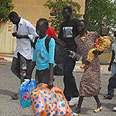
For the last few nights, the “Angel of the Sudanese” as they call her in Beersheba, has not slept. Since the IDF decided that every day they will send refugees from the border with Egypt directly to the streets of Beersheba, she has not rested.
Nearly every night Elisheva receives a call from an army source who leaks the news that between 30-50 refugees have arrived. Everyone has their conscience pricked when they see refugees on the street, but very few actually help. Elisheva and her friends from the Spitzer Department of Social Work are doing most of the work.
The Sudanese refugees already know her name and some of them have a note in their pockets with her telephone number. They even call her before they enter the country: a few days ago she received a call from a Sudanese refugee in Egypt who needed help. Meanwhile, she has managed to find solutions for most of the refugees, around 1200 people since the beginning of the year.
This year she was due to graduate with a degree in social work. “How is it possible to study for an exam when you know that outside there are 15 families who have just entered the country and have nowhere to go?” she asks.
Elisheva is studying in the Spitzer Department of Social Work at Ben-Gurion University of the Negev, a department which is well-known for its community projects. In February of this year, the department decided that as part of the practical work, the students would meet with Sudanese refugees housed in southern kibbutzim. The department initiated the project together with the “Assaf” organization, headed by Yiftach Milo.
During this project, for the first time, Elisheva was exposed to stories on the atrocities in southern Sudan which could make your hair stand on end. She decided to do something, together with Milo and the activists from the Center assisting foreign workers.
“One day I read a story in the press that IDF soldiers serving on the border were providing milk powder and diapers for the refugee children,” Elisheva recalls.
“Together with other volunteers, I immediately organized an emergency appeal, together with Ben-Gurion’s Community Action Unit. But it was nothing compared to what happened when the story broke about the bus that the IDF sent to the police station in Beersheba with 35 refugees.
"The police refused to receive the refugees and the bus began to travel through the streets of the city. Our e-mail inboxes were overloaded with requests to help. It became a full-time job. Then we made contact with Irit Rabinovitch from Smart in Eilat, who absorb the refuges and find them work in hotels. I began sending refugees and their families," she said.
"The slow trickle of refugees became a flood. The IDF decided that everyone who crosses the border from Egypt will be sent to Beer-Sheva. There are soldiers who feel terrible about what is going on and call me asking for help for the refugees.”
While Elisheva is speaking, her phone rings. She receives word that at that moment the IDF has dumped 50 refugees in Beersheba. She cuts the interview short and hurries away.
Elisheva has no doubt what the State has to do. “Firstly, the government has to recognize the refugees as war refugees and give them rights. Then they must establish an organized body which will absorb the refugees and which will approach the UN for aid. It’s clear to everyone that Israel is a small country which can’t absorb the large number of refugees who would like to enter.”
“Today I attended a debate in a committee in the Knesset. When it was over and people began to disperse, I ran after the MKs and told them that now I have 20 people with nowhere to put them. I asked for help, but they brushed me aside. With no other choice, I returned to Beersheba and began to telephone and consult friends about what we should do with today’s load.”
“Sometimes I sit and think about how I am dealing with their fate. I can’t understand why the State can’t take this project on itself, but I do understand that I have no choice, it has fallen on me and I have to take care of it.”
Translated by Jacqueline Watson-Alloun















